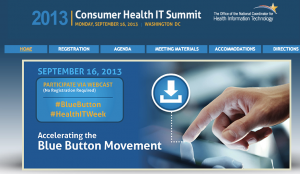Monday Sept. 16 is the 2013 Consumer Health IT Summit. That means we, the patients, are the focus – we and our data, of course! – along with the providers (doctors, nurses, practices, hospitals) who serve us.
You can watch live, online, without prior registration. But you need Adobe Flash Player so be sure you have it (this page) then come watch live!
9:00 a.m. to 1:00 p.m. EDT
Monday, Sept. 16, 2013
Read more about the event on its site.
Note: this time it’s not just us data geeks (and our leaders like Todd Park and Farzad Mostashari) – this time the Office for Civil Rights is involved – all the way up to Leon Rodriguez, the director of OCR. Why? Because – did you know this? – it’s a Federal civil rights violation for a provider to deny us our health data!
I personally have used that fact in a conversation with a provider who said I couldn’t have my data. It worked wonders.:-) (See “You can ask to see or get a copy of your medical record & other health information” on my personal site.)
Twitter participation:
Apparently two different hashtags will be used. (That’s generally not a great idea but here we are.) They are #BlueButton and #NHITweek. (The latter is according to Sherry Reynolds in the first comment below.) Here’s a Twitterfall link to watch both links simultaneously.
The event’s focus this year is “Accelerating the Blue Button Movement”
As regular readers know, Blue Button is a combination of philosophy and technologies that boil down to this: Give us our data! Blue Button has changed a lot in the past year or two – there’s lots to learn about what’s new and what it means for your ability to engage in your care – participatory medicine.
Several SPM members will be there and even involved with the event.
- Matthew Holt of Health 2.0 is leading an unconference in the afternoon
- Lygeia Ricciardi, head “Consumerista” at ONC, is in charge of the whole event
- Sherry Reynolds (@Cascadia) leads the provider side, corresponding to Lygeia on the consumer side
- Catherine Rose, who placed second in the Blue Button Developer Challenge
- I’ll be giving the opening talk (15 minutes)
- Ryan Witt
- Casey Quinlan
- Adrian Gropper
- Mary Anne Sterling
- Keith Boone, author of the e-Patient Rap
- SPM President-Elect Josh Seidman!
____Also there, unexpectedly:____________ - Dr. Danny Sands (SPM co-founder and co-chair)
- Regina Holliday
- AJ Chen
- Donna Cryer
- Phil Deering
- Mary Griskiewicz
- Ross Martin
- Sue Woods
- Lisa Raileanu
I know there were more but I’m horrible at remembering names – if you were there, email me dave at epatientdave.com.
As Sherry points out in her comment below, there will be numerous breakout sessions (special interest groups) in the afternoon. See the event’s side (above) for details.
I’ll update this with more information as it arrives, but for now, spread the word and get ready to watch!







In the afternoon there will be multiple breakout sessions and during the one for providers multiple regional extension centers (REC’s) will be announcing that they are going live with services to help providers implement patient centered Health IT. (FYI the project I direct)
We don’t simply want patients to have their data but an ongoing relationship with their care team so that includes everything from patient portals and online appt scheduling support to helping assess patients needs and changing workflows.
Dave is even highlighted on the Key Health Alliance website but is too modest to mention it so I will http://www.khareach.org/patient-engagement-portal
BTW the hashtag now appears to be #NHITweek as both HIMSS and ONC are using that.
Thanks for the additions, Sherry! I’m putting the hashtags in the post and will refer people to here re the breakout sessions.
You are incredible Dave.. We have reached a pivotal time in healthcare and my world or healthcare IT in which patient advocates like myself are now in the position of getting providers engaged!
We have come so far so fast but much remains to be done.. We can’t simply be content to stop when we “get our data” we need entire systems of care and the technology that supports that care to be designed around individuals/ patients needs.